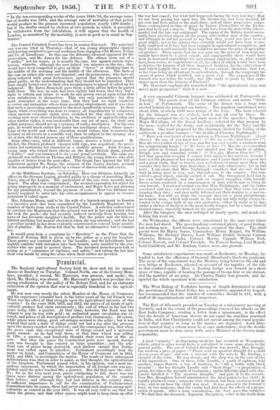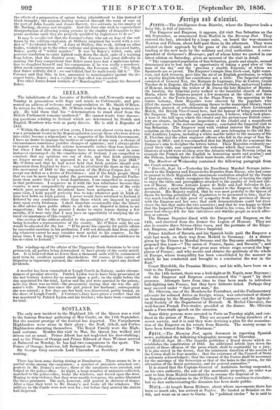Vrouintial.
The Banbury Agricultural Society held its show and ate its annual dinner at Banbury on Tuesday. Colonel North, one of the County Mem- bers, presided ; a second, Mr. Harcourt, was present, and spoke ; the third, Mr. Henley, was absent. Mr. Harcourt's speech was peculiar for a strong vindication of the policy of Sir Robert Peel, and for an elaborate refutation of the opinion that war is especially beneficial to the agricul- turist.
He was now very nearly the oldest Member of the House of Commons, and his experience extended back to the latter years of the old French war. What was the effect of that struggle upon the agricultural interests of this country ? In the years 1810, 1811, and 1812, the prices of all kinds of agri- cultural produce had risen enormously ; the cost of wheat in the last two years being 1208. a quarter. At that time, however, the Bank was not obliged to pay its way with gold ; an unlimited paper circulation was al- lowed, and prices of all descriptions of produce rose enormously. Of course, while prices were rising, great advantages accrued to the seller • but it was evident that such a state of things could not last a day after the pressure upon the money-market was relieved ; and the consequence was, that when the peace came this exceptional state of things ceased and a universal panic ensued : as he had told them, at that time wheat was selling at 1208. a quarter, and landlords thought their rents low at 80s. an acre. But after the peace the Continental ports were opened, foreign corn was brought to this country in large quantities ; and the arti- ficial rate of prices being destroyed, such distress ensued that Parlia- ment was called upon to interfere. Parliament accordingly took the matter in hand ; and Committees of the House of Commons sat in 1813, 1814, and 1815, to investigate the matter. The result of their subsequent deliberations was, that in order to assist, as they thought, the agriculturists of the kingdom, Parliament passed what, in his opinion, was a most ini- quitous enactment, by which the importation of all foreign corn was pro- hibited until the price reached 808. a quarter. But did that cure the evil? No; for in the very next year, prices continuing to fall, there was ten times more distress among the agricultural population of the country than before ; and although they had had distress in the country since, of sufficient importance to call for the examination of Parliamentary Committees into its causes, there had never existed such distress among agri- culturists as existed in the year 1815. It was all very well to say that war raises the prices, and that other causes might tend to keep them up after the war had ceased; but what had happened during the very last war? Had we not been paying tax upon tax, the income-tax had been doubled, 10 per cent had been added to the malt-duty, and all those progressive reduo- tions contemplated in time of peace by former Chancellors of the Exche- quer had been put a stop to. What would have been the state of the labour- market had the late war continued? The ranks of the Militia would neces- sarily have absorbed almost all the yOung able-bodied men of the country ; and although he did not pretend to say that they would not have been of great utility, yet in his opinion they certainly would not have been so use- fully employed as if they had been engaged in agricultural occupations, and their absence would naturally, have tended to increase the price of agricultu- ral produce. Then, again, had the war gone on, the price of iron must na- turally have risen to a great extent ; and consequently there would have been an increased expenditure for agricultural implements, or, what would havebeen worse, no expenditure at all, the effect of which would have been to deprive the farmers of all those improved facilities for the cultivation of land which happily they now possess. It was evident, therefore, that war, so far from being an advantage to agriculturists, through the temporary in- crease of prices which resulted, was a great evil. The experience of the French war was before the world ; and who ought to profit by that expe- rience more than the farmers of England ?
Mr. Harcourt emphatically remarked that " the agricultural class was never more prosperous" than it is now.
A very successful Crimean banquet was celebrated at Portsmouth on Tuesday. The guests were all the Crimean soldiers and sailors "with- in hail" of Portsmouth. The scene of the dinner was a huge tent erected behind the principal sea battery. The numbers entertained were about 2500, of whom 1500 were troops of the Line.- The hour selected for the banquet was one o'clock, and it was all over by three. Dr. Engledue occupied the chair, and made most of the speeches ; Sergeant- Major M`Callum, of the Royal Artillery—selected for that purpose by the men—replied for the Army, and incidentally for the Navy and the Marines. One toast proposed by the chairman elicited the feeling of the soldiers in a peculiar manner—" the health of Florence Nightingale." " Have you ever heard of such a person as Florence Nightingale. (load cheers.) Do any of you know her ? (" 1Ve do, we do ; God bless her !") Has she ever tended on any of you, and did you ever receive a kindness from her sympathizing hands ? (" !Fe hare, we have !") Has she ever smoothed your pillow in Scutari hospital, and afforded you the benefit of philan- thropic acts and consoling words ? (" Yes, yes, Heaven bless her r') I feel that upon this occasion I cannot refer much to her services, because I have not the pleasure of her acquaintance; and I know that it is a great fact and a great truth, that to bestow even well-deserved praise upon those who consider they have only done their duty, is not only unnecessary, but in bad taste. I am aware that Miss Nightingale considers that she only did her duty in doing good to you, and, through you, to the country. She con- ceived a great object, and she carried it out. She throughout held fast to her own individuality, and she took no counsel excepting with herself. Every action rendered by a consciousness of duty will be sure to bring its own reward. I need not remind you that Miss Nightingale, and the ladies associated with her, conceived in their conscience that they were but per- forming their duty ; and they nobly followed out their designs to a success- ful issue. You will see from the example they set a great philanthropic movement arose, which will result in the Army not only being always at- tended to by a large body of my own profession, either by night or by day, under a shower of shells or in the most deadly danger, but by a large band of trained nurses, especially formed for the purpose." After the banquet, the men indulged in manly sports, and much rol- licking fun went on.
On Wednesday, the officers were entertained in the same tent where the men had dined. The speechmaking contained plenty of good feeling, but nothing new. Lord George Lennox occupied the chair. The chief guests were Sir Harry Jones, Commodore Henry Keppel, Sir William Williams, Sir Richard Deems, Lord William Paulet, General Cannon otherwise Bchram Pasha, Colonel Morris, Captain William Peel, Colonel Norcott, and Colonel Teesdale. Sir Francis Baring, Lord Monck, Lord Guildford, and Mr. Bonham Carter, wore also present.
Some satisfactory experiments was made at Rochester, on Monday, in- tended to test the efficiency of General Blanshard's block-tin pontoons. The scene of the experiment was the Medway lying between the old and new bridge at Rochester, selected on account of the rapidity of the tide in that confined space. Here a floating bridge was formed in a short space of time, capable of bearing the passage of troops four or six abreast, and the materiel of an army. Sir Charles Pasley was present, and in- spected the whole operation with satisfaction.
the effects of a preparation of opium being administered to him instead of black draught ; the mistake having occurred through the want of care on the part of John Lundie and James Barrett, two servants in the employ of Mr. Barling, chemist and druggist. And the Jury also wish to expresstheir disapprobation of allowing young persons in the employ of druggists to dis- pense medicine until they are properly qualified by experience to do so."
It may be recollected that the Coroner's Jury who sat on four of the suf- ferers by the colliery-explosion at Oldbury surprised the world with a ver- dict of "Accidental death." A Jury at Dudley, this week, sitting on other bodies, wished to go to the other extreme and pronounce the deceased butty,
Baker, guilty of "wilful murder." It was Baker's wilful, rash, and perverse resolution to carry lighted coals down the shaft, spite of a warning from below, that the disaster arose. The Coroner had great difficulty in making the Jury comprehend that Baker must have had a malicious inten- tion to slaughter himself and his companions if he was really a murderer. After much conversation and consultation, the Foreman said, " We think that Baker wilfully did it : we can't think that he maliciously did it." The Coroner said that this, in law, amounted to manslaughter against the de- ceased batty, Baker ; and a verdict to that effect was recorded.
Two other Juries found verdicts of " Manslaughter" against the deceased Baker.



























 Previous page
Previous page